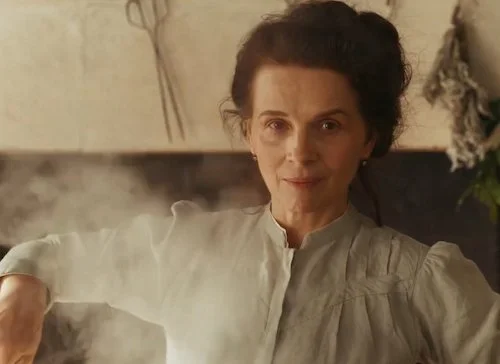The Taste of Things
Written by Andreas Babiolakis
Ah, the art of the food film. Nothing gets hearts racing, eyes wide, and tongues salivating quite like a motion picture that frames fine dining and the culinary arts. When an entire feature is dedicated towards the best that cuisine has to offer? Forget about it. There’s a reason why classics like Babette’s Feast and Tampompo will never die down, and why a weaker film like Julie & Julia can still resonate to some degree years after its release. If there should be a director trying their hand at culinary film, it’s French-Vietnamese filmmaker Trần Anh Hùng, best known for The Scent of Green Papaya, Eternity, and Norwegian Wood (the latter being a faithful depiction of Haruki Murakami’s style of intrinsic writing). Hùng has returned with The Taste of Things: a slow burning (or slow cooking, I’d say) romantic drama that gestates ever so slowly as to not spoil the dish, allowing each shot to linger like a delicious flavour that you don’t want to ingest too quickly.
It’s as if Hùng took notes from Jacques Rivette and his film La Belle Noiseuse, which scrutinizes an artist’s painstaking process by capturing every single second. It sounds dull, but it works to full effect, allowing you to get enraptured by every stroke of charcoal until it amounts to a fully realized sketch. The Taste of Things fixates on the preparation of meals — as well as the actual dining process, bite by bite — similarly, encouraging you to fall in love with confections that you may have never thought were even possible (cooking does seem like an endless conquest where there are new dishes to discover even years into one’s studies). This lust for life also has a narrative component to it, don’t you worry. Dodin (Benoît Magimel) owns an established restaurant that only offers the highest pedigree of dishes. Eugénie (Juliette Binoche) has worked for him for over twenty years, and both her expertise and her character made Dodin fall in love with her over time. While Eugénie reciprocates these feelings, she ignores them and doesn’t want to be tied down. Is there a meal that could win her over? Dodin aims to find out.
The Taste of Things will get you acquainted with food unlike many films in recent memory.
One of the most invigorating novels I’ve ever read is The Supper of the Lamb by Robert Farrar Capon, as his religious affiliations and life experiences turn what should have been an ordinary cookbook into a spiritual reawakening of how one should eat; this goes beyond just what ingredients to use, but how to best honour the meat of a fallen animal, for instance. The Taste of Things brings out a similar rejuvenation in me as I see these magnificent meals slowly being prepared with care; there’s no jump-cutting in this film. Life itself takes a backseat to the cooking sequences as if to say life is what we make of it. For Eugénie and Dodin, all of their best and worst experiences were bookmarked by dishes they prepared or ate. The Taste of Things makes sure to spotlight these instances: both the romantic and the tragic. Eating is to refuel one’s energy through sustenance, and so we remind ourselves of an allegory of how we should live our lives multiple times every single day. We must adore what we do, and make every instance count. The Taste of Things indulges in every meal, allowing you to do the same. It won’t be everyone’s preference, but those looking for such a respectful, passionate depiction of feasting mustn’t look any further than this gorgeous film.
Filmmaking is also a labour of love, and you can feel Hùng put many hours into The Taste of Things. From the multi-layered sound palette that makes us feel like we are seated at the table or in the kitchen with these characters, to the stunning cinematography that allows every scene to feel perfectly toasted, The Taste of Things was clearly handled properly and with the utmost care. This only adds to the cuisine on screen, as it is evident that everyone present loves what they do, be it acting, shooting, or meal preparation. Any additional aesthetics are savoured for the right moments, including music being utilized just as soon as those end credits are about to roll (and pretty much nowhere else); you mustn’t use too much of anything and spoil the casserole. Even though The Taste of Things felt like I had lived a lifetime with these people due to its slow pace (obviously intentional), it only made each meal all the more appetizing (I wanted to try pretty much every dish on screen), and each aspect of how the film was made stronger. Oh, to fall in love with film and food all over again! In the same way that these characters share and find life in what they cook and consume, Hùng has found purpose and meaning in the art of filmmaking, which is so clearly present in The Taste of Things: another triumph in a career that is full of them.
Andreas Babiolakis has a Masters degree in Film and Photography Preservation and Collections Management from Ryerson University, as well as a Bachelors degree in Cinema Studies from York University. His favourite times of year are the Criterion Collection flash sales and the annual Toronto International Film Festival.







